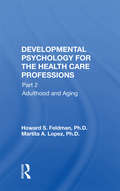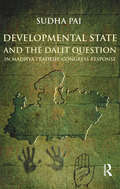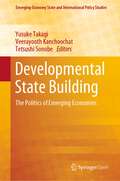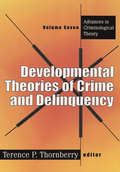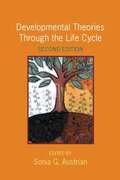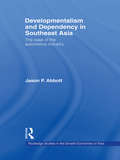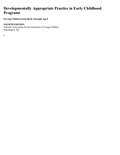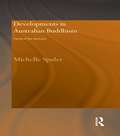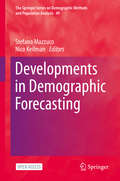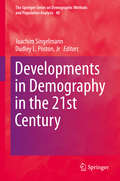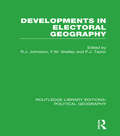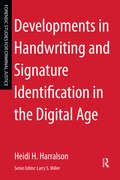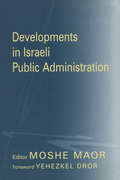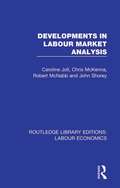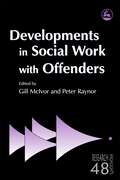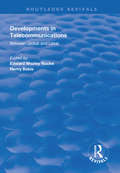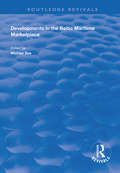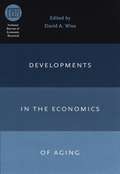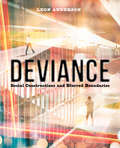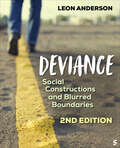- Table View
- List View
Developmental Psychology For The Health Care Professions, Part Ii: Young Adult Through Late Aging
by Howard. S. FeldmanFirst published in 1982. Since the 1960s, there has been growing interest in and research on the adult years of the life cycle. Previously, developmental studies had focused on childhood and adolescence, in which an orderly relationship between age and growth was assumed. This volume looks at three periods of adulthood identified on the basis of chronological age: young adulthood, from 18 to 40; middle adulthood, from 40 to 65; and later adulthood, from 65 until death. The authors of the series volumes are behavioral scientists with considerable experience in the education of health care professionals. Most of them are also clinicians, and their varied experience enables them to present their topics in a readable fashion. The content of the texts presumes only a very basic knowledge of the behavioral sciences, and emphasis is placed on the practical implications of research findings for health care delivery.
Developmental State and the Dalit Question in Madhya Pradesh: Congress Response
by Sudha PaiDalit assertion has been a central feature of the states in the Hindi heartland since the mid-1980s, leading to the rise of political consciousness and identity-based lower-caste parties. The present study focuses on the different political response of the Congress party to identity assertion in Madhya Pradesh under the leadership of Digvijay Singh. In Uttar Pradesh and Bihar, in response to the strong wave of Dalit assertion that swept the region, parties such as the Bahujan Samaj Party (BSP) and the Rashtriya Janata Dal (RJD) used strategies of political mobilisation to consolidate Dalit/backward votes and capture state power. In Madhya Pradesh, in contrast, the Congress party and Digvijay Singh at the historic Bhopal Conference held in January 2002 adopted a new model of development that attempted to mobilise Dalits and tribals and raise their standard of living by providing them economic empowerment. This new Dalit Agenda constitutes an alternative strategy at gaining Dalit/tribal support through of state-sponsored economic upliftment as opposed to the political mobilisation strategy employed by the BSP in Uttar Pradesh. The present study puts to test the limits of the model of state-led development, of the use of political power by an enlightened political elite to introduce change from above to address the weaker sections of society. The working of the state is thus analysed in the context of the society in which it is embedded and the former’s ability to insulate itself from powerful vested interests. In interrogating this state-led redistributive paradigm, the study has generated empirical data based on extensive fieldwork and brought to the fore both the potentials and the limitations of using the model of ‘development from above’ in a democracy. It suggests that the absence of an upsurge from below limits the ability of an enlightened political elite that mans the developmental state to introduce social change and help the weaker sections of society.
Developmental State Building: The Politics of Emerging Economies (Emerging-Economy State and International Policy Studies)
by Tetsushi Sonobe Yusuke Takagi Veerayooth KanchoochatThis open access book modifies and revitalizes the concept of the ‘developmental state’ to understand the politics of emerging economy through nuanced analysis on the roles of human agency in the context of structural transformation. In other words, there is a revived interest in the ‘developmental state’ concept. The nature of the ‘emerging state’ is characterized by its attitude toward economic development and industrialization. Emerging states have engaged in the promotion of agriculture, trade, and industry and played a transformative role to pursue a certain path of economic development. Their success has cast doubt about the principle of laissez faire among the people in the developing world. This doubt, together with the progress of democratization, has prompted policymakers to discover when and how economic policies should deviate from laissez faire, what prevents political leaders and state institutions from being captured by vested interests, and what induce them to drive economic development. This book offers both historical and contemporary case studies from Japan, South Korea, Taiwan, Singapore, Indonesia, Malaysia, Myanmar, Ethiopia, Kenya, and Rwanda. They illustrate how institutions are designed to be developmental, how political coalitions are formed to be growth-oriented, and how technocratic agencies are embedded in a network of business organizations as a part of their efforts for state building.
Developmental Theories of Crime and Delinquency (Advances In Criminological Theory Ser. #No. 7)
by Terence P. ThornberryIn Developmental Theories of Crime and Delinquency, Terence P. Thornberry and his contributors show that criminal behavior is not a static human attribute, but ebbs and flows over the life course of the individual. Criminal behavior tends to follow a distinct psychological pattern. It is relatively uncommon during childhood, is initiated by most offenders during adolescence, flourishes during late adolescence and early childhood, and usually diminishes or disappears by the mid-twenties. This pattern is not characteristic of all people--some never commit crimes and others become career criminals--but it is a general description of the developmental pattern of criminal offenders. This pattern has profound implications for theories of crime and delinquency. Not only does it explain initiation into, maintenance of, and desistance from involvement in crime, it offers insight into why crime flourishes during adolescence. Traditional theories of crime and delinquency have often failed to distinguish among different phases of criminal careers. They tend to ignore developmental changes that occur across a person's life course, changes that coincide with and can explain the causes and patterns of criminal behavior. This paperback edition of the seventh volume of the distinguished series Advances in Criminological Theory moves us from static identifications of the criminal by presenting a broad range of developmental explanations of crime. Each contributor articulates a developmental or life course perspective in explaining how people become involved in delinquency and crime. Each covers a wide range of theoretical territory and reveals how a developmental perspective enhances the explanatory power of traditional theories of crime and delinquency. This volume is an invaluable tool for criminologists, sociologists, psychologists, and other professionals seeking to teach how crime and violence can be understood in our culture.
Developmental Theories Through the Life Cycle
by Austrian Sonia G. Ed.In this bestselling textbook, contributors describe theories of normal human development advanced by such pioneers as Sigmund Freud, Anna Freud, Jean Piaget, Nancy Chodorow, Daniel Levinson, Erik Erikson, and Margaret Mahler. Beginning with infancy, toddlerhood, and preschool, each chapter examines corresponding ideologies concerning maturation and development in middle childhood, adolescence, adulthood, and old age, while acknowledging that no one theory can encompass all aspects of human development. In-depth analyses of the psychology and sociology of development provide educators and practitioners with insights into the specific social contexts of human behavior and help identify variables and deviations. This second edition features up-to-date empirical information, including additional studies on diverse populations, and a new chapter on attachment theory, a growing area of interest for today's clinicians.
Developmental Theories Through the Life Cycle (2nd Edition)
by Sonia G. AustrianThe life cycle, until recently, has been neither descriptive nor conceptual but metaphorical, suggesting an underlying sequence of events that everyone experiences rather than clear external milestones of development, althought every life, of course, is acknowledged to be unique.
Developmentalism and Dependency in Southeast Asia: The Case of the Automotive Industry (Routledge Studies in the Growth Economies of Asia #Vol. 38)
by Jason P. AbbottThis book provides a detailed cross-country study of the automotive industry in South East Asia. Abbott argues that, contrary to prevailing opinion, the diffusion of manufacturing in the Asia-Pacific has been characterized by hierarchical networks of production linked to Japan for technology.
Developmentally Appropriate Practice In Early Childhood Programs: Serving Children From Birth Through Age 8
by Barbara Willer Sue Bredekamp Susan Friedman Brian L. Wright Marie L. MastersonDevelopmentally appropriate practice is the foundation on which quality early learning is built. The fourth edition of this classic, influential text addresses developmentally appropriate practice within the context of the ever-changing and evolving world of early childhood education. With a strong focus on equity and teaching and supporting all children, it underscores the importance of social, cultural, and historical contexts of development.
Developments in American Politics 9
by Bruce E. Cain Gillian Peele Jon Herbert Andrew WroeThis textbook provides students of US Politics with an informed scholarly analysis of recent developments in the American political environment, using historical background to contextualize contemporary issues. As the ninth edition, this book reviews a time of political controversy in the United States, touching on topics such as gender, economic policy, gun control, immigration, the media, healthcare, the COVID-19 pandemic, and the widespread social protests against police brutality. The book looks both backwards to Trump's presidency and forward to Biden's. Ultimately, the editors and contributors evaluate the significance of these events on the future of American politics, providing a perspective that is at once broad and meticulous.
Developments in Australian Buddhism: Facets of the Diamond (Routledge Critical Studies in Buddhism #Vol. 22)
by Michelle SpulerThis book examines the adaptation of Buddhism to the Australian sociocultural context. To gain insight into this process of cross-cultural adaptation, issues arising in the development of Diamond Sangha Zen Buddhist groups (one of the largest Zen lineages in the West) in Australia are contextualised within the broader framework of the adaptations of Buddhist teachings and practices in other Westernised countries. The book also examines the methodological approaches currently used for studying this process and suggests a synthesis of the approaches used for studying convert and ethnic Buddhist groups.
Developments in Demographic Forecasting (The Springer Series on Demographic Methods and Population Analysis #49)
by Stefano Mazzuco Nico KeilmanThis open access book presents new developments in the field of demographic forecasting, covering both mortality, fertility and migration. For each component emerging methods to forecast them are presented. Moreover, instruments for forecasting evaluation are provided. Bayesian models, nonparametric models, cohort approaches, elicitation of expert opinion, evaluation of probabilistic forecasts are some of the topics covered in the book. In addition, the book is accompanied by complementary material on the web allowing readers to practice with some of the ideas exposed in the book. Readers are encouraged to use this material to apply the new methods to their own data. The book is an important read for demographers, applied statisticians, as well as other social scientists interested or active in the field of population forecasting. Professional population forecasters in statistical agencies will find useful new ideas in various chapters.
Developments in Demography in the 21st Century (The Springer Series on Demographic Methods and Population Analysis #48)
by Dudley L. Poston Joachim SingelmannThis book introduces demographic applications which employ current demographic concepts and theories and cutting-edge methods and findings, all of which have and will continue to have an impact in the broad area of social demography. Through providing an introduction to new and current developments in demography, methodological and statistical issues, data issues, issues of health, aging and mortality, and issues in social demography, this book gives new insights into data, substantive issues, and methodological approaches that will assist readers in their use of demography in their research. At the same time it shows demographers, sociologists, economists, statisticians, methodologists, planners, and marketers how they may learn and improve upon the quality and relevance of their demographic investigations now and in the future.
Developments in Electoral Geography (Routledge Library Editions: Political Geography)
by Ron Johnston Fred M. Shelley Peter J. TaylorThe essays in this collection show how electoral geography has shifted from empiricist activity towards a closer involvement with the wider issues addressed by social scientists. They illustrate the potential contributions that electoral geographers can make towards the understanding of global, national and local societies.
Developments in Handwriting and Signature Identification in the Digital Age
by Heidi H. HarralsonThe examination of handwriting and signatures has a long and established history as a forensic discipline. With the advancement of technology in the use of digital tablets for signature capture, changes in handwriting examination are necessary. Other changes in handwriting, such as in increase in printed writing styles and the decrease in handwriting training in schools necessitates a re-examination of forensic handwriting identification problems. This text takes a fresh and modern look at handwriting examination as it pertains to forensic, legal, and criminal justice applications.
Developments in Israeli Public Administration (Israeli History, Politics and Society #Vol. 18)
by Moshe Maor Yehezkel DrorThe "Israeli History, Politics and Society" series comprises multidisciplinary studies that range from elections and the Yom Kippur war to the search for a true Israeli identity and the various initiatives to foment or prevent the peace process. This volume brings together a set of articles that try to estimate the direction of developments in Israeli public administration: whether ministries will remain under the ambit of the Weberian model, follow the New Public Management model, or move towards a mix of the two. Each essay focuses on a specific factor which may inhibit reforms, such as the weakness of mechanisms for policy control, monitoring and evaluation; lack of co-ordination between the different ministries; lack of effective accountability mechanisms; an administrative culture that is characterized by frequent infringements of moral integrity; a high level of politicization; and a Supreme Court which plays a paramount role by routinely intervening in the practices of public administration as well as in the business of other governmental and non-governmental institutions. Each article probes how these distinctive features of Israeli public administration reflect underlying traits of the nation's history, culture and geography, and gauges the extent to which formal structures provide an indication of how policy-making and programme implementation really operate.
Developments in Labour Market Analysis (Routledge Library Editions: Labour Economics #11)
by Caroline Joll Chris McKenna Robert McNabb John ShoreyFirst published in 1983. This text is designed to enable intermediate and advanced students to attain familiarity with the theoretical concepts used in labour market analysis, and to apply them fruitfully to the economic problem of labour markets. Each chapter of Section I deals with a different theoretical development of the basic labour market model of utility maximising labour supply and the marginal productivity theory of labour demand. In addition, the authors discuss in depth uncharted territory including the analysis of uncertainty and discrimination in labour markets and advances in human capital theory, in each case covering the implications both for equity and the efficient allocation of resources. Each chapter of Section II analyses an important economic problem - for instance wage determination, unemployment and inflation - using the theoretical insights derived from Section I. The contributions of different theoretical developments are assessed by reference to the current state of empirical research into labour market problems. This book stresses the interaction between labour market mechanisms and also between market and non-market forces in the belief that this will lead to a greater understanding of the operation of the labour market than can be gained by viewing each theoretical development in isolation from the others.
Developments in Social Work with Offenders
by Fergus Mcneill David O ''Mahony Maurice Vanstone Bill Whyte James Bonta Peter Raynor David O'Mahony Loraine Gelsthorpe Barry Goldson Tim Chapman Gill Mcivor Steve Wormith James Mcguire Iain Crow Sam Lewis Sue Rex Gwen Robinson Chris Trotter Frank Porporino Shadd MarunaDevelopments in Social Work with Offenders explains the organisational and legislative changes that have occurred in social work and probation across the UK in the past 10 years, in the context of the accumulating body of knowledge about what constitutes effective practice in the assessment, supervision and management of offenders in the community. Three different aspects of working with offenders are covered: developments in policy; assessment, supervision and intervention; and issues and needs. Contributions from experts in the field discuss issues such as community `punishment', case management, accreditation and resettlement. The continuing concern with promoting evidence-based solutions to crime is addressed, and this book will assist professionals working with offenders with making focused interventions supported by research. This book will be essential reading for students of social work and probation and criminology, probation officers and social workers.
Developments in Telecommunications: Between Global and Local (Routledge Revivals)
by Edward Mozley Roche Henry BakisPublished in 1997. Developments in information technology and telecommunications are giving new meaning to the concepts of space and time. In particular the concepts of "local" and "global" are starting to merge together even though they apparently represent entirely different scales. One example is "telework", also known as "telecommuting". Another is the rapid growth of outsourcing. These developments are based on new technologies such as multimedia, rapid improvements in storage technologies, and the information superhighway, including the Internet. The structure of the world's telecommunications industry is changing and, in addition, political and social autonomy is breaking down. The role of the nation state is challenged, as are the old avenues and levers of political power. Nation states have attempted to grab functional control over the emerging infrastructure, but they are ultimately unable to exert control over the flood of information surging around the world. There still remains a strong middle ground between local and global, dominated by multinational corporaions and governments.
Developments in the Baltic Maritime Marketplace (Routledge Revivals)
by Michael RoePublished in 1997. This text is the second in a series of volumes that comprise a collection of papers which have emerged from the Institute of Maritime Transport and Seaborne Trade at the University of Gdansk and the Institute of Marine Studies at the University of Plymouth. The former is the leading teaching and research institute in maritime business in Eastern Europe, the latter is the leading establishment in Western Europe. In this volume, the focus of attention is upon the marketplace changes that have, and continue to take place in the region, concentrating in particular upon the shipping and ports sectors but with coverage also of safety issues and those stemming from the development of new infrastructure links in the region.
Developments in the Economics of Aging
by David A. WiseThe number of Americans eligible to receive Social Security benefits will increase from forty-five million to nearly eighty million in the next twenty years. Retirement systems must therefore adapt to meet the demands of the largest aging population in our nation's history. In Developments in the Economics of Aging, David A. Wise and a distinguished group of analysts examine the economic issues that will confront policy makers as they seek to design policies to protect the economic and physical health of these older Americans. The volume looks at such topics as factors influencing work and retirement decisions at older ages, changes in life satisfaction associated with retirement, and the shift in responsibility for managing retirement assets from professional money managers of traditional pension plans to individual account holders of 401(k)s. Developments in the Economics of Aging also addresses the complicated relationship between health and economic status, including why health behaviors vary across populations and how socioeconomic measures correlate with health outcomes.
Devenir Féministe: un guide masculin pour la défense des droits de la femme et de l’égalité
by Steve ChiabaUn guide du féminisme moderne pour les hommes Avez-vous déjà été victime de violences, de haine, de harcèlement, ou de souffrances du fait de votre genre ? Être féministe ou pratiquer le féminisme implique de se battre pour des problématiques importantes, comme la parité salariale, le respect, les congés de maternité, les droits liés à la procréation, la violence domestique, etc. Si vous voulez en savoir plus sur la lutte pour vos droits et sur la lutte pour les droits des femmes partout dans le monde, alors ce guide est pour vous. - Apprenez à devenir féministe. - Apprenez à vous battre pour vos droits. - Luttez pour l’équité et la parité salariale. - Et bien plus encore ! Apprenez à être du bon côté de l'histoire en aidant l'humanité là où elle a le plus besoin de vous ! --> Retournez en haut de la page et cliquez sur Ajouter au panier pour le commander dès maintenant Avertissement : Cet auteur ou le(s) titulaire(s) des droits ne revendique, ne promet ni ne garantit l’exactitude, l’exhaustivité ou l’adéquation du contenu de ce livre, et décline expressément toute responsabilité pour les erreurs et omissions qui s’y trouveraient. Ce document est diffusé à titre purement informatif. Veuillez consulter un professionnel avant de prendre toute mesure sur le contenu de ce livre.
Deviance: Social Constructions and Blurred Boundaries
by Leon AndersonDeviance: Social Constructions and Blurred Boundaries draws on up-to-date scholarship across a wide spectrum of deviance categories, providing a symbolic interactionist analysis of the deviance process. The book addresses positivistic theories of deviant behavior within a description of the deviance process that encompasses the work of deviance claims-makers, rule-breakers, and social control agents. Students: are introduced to the sociology of deviancelearn to analyze several kinds of criminal deviance that involve unwilling victims—such as murder, rape, street-level property crime, and white-collar crimelearn to examine several categories of “lifestyle” and “status” deviancedevelop skills for critical analysis of criminal justice and social policies Overall, students gain an understanding of the sociology of deviance through cross-cultural comparisons, historical overview of deviance in the U.S., and up-close analysis of the lived experience of those who are labeled deviant as well as responses to them in the U.S. today.
Deviance: Social Constructions and Blurred Boundaries
by Leon AndersonDeviance: Social Constructions and Blurred Boundaries is designed for courses on social deviance that take a strong sociological perspective. The book draws on up-to-date scholarship across a wide spectrum of deviance categories, providing a symbolic interactionist analysis of the deviance process. The book addresses positivistic theories of deviant behavior within a description of the deviance process that encompasses the work of deviance claims-makers, rule-breakers, and social control agents. Students are introduced to the sociology of deviance and learn to analyze several kinds of criminal deviance that involve unwilling victims-such as murder, rape, street-level property crime, and white-collar crime. Students also learn to examine several categories of "lifestyle" and "status" deviance and develop skills for critical analysis of criminal justice and social policies. Overall, students gain an understanding of the sociology of deviance through cross-cultural comparisons, historical overview of deviance in the U.S., and up-close analysis of the lived experience of those who are labeled deviant as well as responses to them in the U.S. today
Deviance: Social Constructions and Blurred Boundaries
by Leon AndersonDeviance: Social Constructions and Blurred Boundaries is designed for courses on social deviance that take a strong sociological perspective. The book draws on up-to-date scholarship across a wide spectrum of deviance categories, providing a symbolic interactionist analysis of the deviance process. The book addresses positivistic theories of deviant behavior within a description of the deviance process that encompasses the work of deviance claims-makers, rule-breakers, and social control agents. Students are introduced to the sociology of deviance and learn to analyze several kinds of criminal deviance that involve unwilling victims-such as murder, rape, street-level property crime, and white-collar crime. Students also learn to examine several categories of "lifestyle" and "status" deviance and develop skills for critical analysis of criminal justice and social policies. Overall, students gain an understanding of the sociology of deviance through cross-cultural comparisons, historical overview of deviance in the U.S., and up-close analysis of the lived experience of those who are labeled deviant as well as responses to them in the U.S. today
Deviance Among Physicians: Fraud, Violence, and the Power to Prescribe (Routledge Studies in Crime and Society)
by Thaddeus L. Johnson Natasha N. Johnson Christina PolicastroThe concept of deviance is complex, given that norms vary considerably across groups, times, and places. Society tends to primarily recognize traditional portraits of deviants such as street-offenders and drug addicts. The label "deviant" is commonly cast upon society’s undesirables, but this socially constructed image often overlooks subtler—and arguably more dangerous—deviance. Physician malfeasance is an especially problematic form, given that medical professionals garner trust, autonomy, and prestige from society, which allows them to operate outside of the public eye. This book responds to a growing number of concerns regarding deviant physician actions such as physically and sexually abusive behaviors, fabricating medical findings and records, and taking advantage of patients (e.g., filing fraudulent Medicaid claims). It explores theoretical explanations for physician deviance, and goes on to consider potential responses such as Medicaid Fraud Control Units, the Questionable Doctors database, and the ability of doctors to police themselves. The unique perspective offered in this book informs discussions of white-collar crime and deviance and has important implications for researchers, policymakers, and students involved in criminal justice and public policy.
